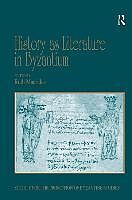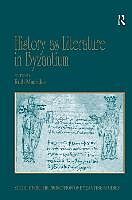History as Literature in Byzantium
Einband:
Fester Einband
EAN:
9781409412069
Untertitel:
Papers from the Fortieth Spring Symposium of Byzantine Studies, University of Birmingham, April 2007
Genre:
Sprach- und Literaturwissenschaften
Autor:
Dr. Ruth Macrides
Herausgeber:
CRC Press
Anzahl Seiten:
350
Erscheinungsdatum:
28.12.2010
ISBN:
978-1-4094-1206-9
Zusatztext 'The collection succeeds in showcasing the variety of approaches now common in the study of Byzantine historiography and presenting the subject as a rich and rewarding field of research.' Speculum 'There is! then! a great deal to feast on in this volume at the levels of the composition and reception of Byzantine history writing; as such! it is a collection which should attract the attention not only of Byzantinists but also those with historiographical interests in other contexts! including western medievalists and Islamic specialists.' Medieval Review Informationen zum Autor Ruth Macrides is Senior Lecturer in the Centre for Byzantine, Ottoman and Modern Greek Studies in the Institute of Archaeology and Antiquity, University of Birmingham, UK Klappentext Although perceived since the 16th century as the most impressive literary achievement of Byzantine culture, historical writing nevertheless remains little studied as literature. This book, devoted to literary interpretations of Byzantine historical writing and analyses of pictorial narratives, illustrates how analyses of texts and images from the 6th to the 14th century work hand in hand with an evaluation of the work as a document of historical value. Zusammenfassung Presents the articles that are concerned with historical and visual narratives which date from the 6th to the 14th century, and show that literary analyses and the study of pictorial devices are preliminary to their further study, exposing the deeper structures and purposes of these texts. Inhaltsverzeichnis Contents: Foreword; Editor's preface; Section I Aesthetics: The aesthetics of history from Theophanes to Eustathios, Stratis Papaioannou. Section II Audience: Uncovering Byzantium's historiographical audience, Brian Croke; Anna Komnene and Niketas Choniates 'translated': the 14th-century Byzantine metaphrases, John Davis. Section III Narrator: Psellos and 'his emperors': fact, fiction and genre, Michael Jeffreys; 'Listen, all of you, both Franks and Romans'; the narrator in the Chronicle of Morea, Teresa Shawcross. Section IV Story-Telling: From propaganda to history to literature: the Byzantine stories of Theodosius' apple and Marcian's eagles, Roger Scott; Dream narratives in historical writing: making sense of history in Theophanes' Chronographia, George T. Calofonos; The Venice Alexander Romance: pictorial narrative and the art of telling stories, Nicolette S. Trahoulia. Section V The Classical Tradition Reinterpreted: A historian and his tragic hero; a literary reading of Theophylact Simokatta's Ecumenical History, Stephanos Efthymiadis; Envy and nemesis in the Vita Basilii and Leo the Deacon: literary mimesis or something more?, Martin Hinterberger. Section VI Sources Reconfigured: The story of the patriarch Constantine II of Constantinople in Theophanes and George the Monk: transformations of a narrative, Dmitry Afinogenov; Engaging the Byzantine past: strategies of visualizing history in Sicily and Bulgaria, Elena N. Boeck; The Synopsis Chronike and hagiography: the presentation of Constantine the Great, Konstantinos Zafeiris. Section VII Structure and Themes: Procopius' Persian War: a thematic and literary analysis, Anthony Kaldellis; La chronique de Malalas entre littérature et philosophie, Paolo Odorico; Rhetoric and history: the case of Niketas Choniates, Athanasios Angelou; Indexes....
Autorentext
Ruth Macrides is Senior Lecturer in the Centre for Byzantine, Ottoman and Modern Greek Studies in the Institute of Archaeology and Antiquity, University of Birmingham, UK
Klappentext
Although perceived since the 16th century as the most impressive literary achievement of Byzantine culture, historical writing nevertheless remains little studied as literature. This book, devoted to literary interpretations of Byzantine historical writing and analyses of pictorial narratives, illustrates how analyses of texts and images from the 6th to the 14th century work hand in hand with an evaluation of the work as a document of historical value.
Zusammenfassung
Presents the articles that are concerned with historical and visual narratives which date from the 6th to the 14th century, and show that literary analyses and the study of pictorial devices are preliminary to their further study, exposing the deeper structures and purposes of these texts.
Inhalt
Contents: Foreword; Editor's preface; Section I Aesthetics: The aesthetics of history from Theophanes to Eustathios, Stratis Papaioannou. Section II Audience: Uncovering Byzantium's historiographical audience, Brian Croke; Anna Komnene and Niketas Choniates 'translated': the 14th-century Byzantine metaphrases, John Davis. Section III Narrator: Psellos and 'his emperors': fact, fiction and genre, Michael Jeffreys; 'Listen, all of you, both Franks and Romans'; the narrator in the Chronicle of Morea, Teresa Shawcross. Section IV Story-Telling: From propaganda to history to literature: the Byzantine stories of Theodosius' apple and Marcian's eagles, Roger Scott; Dream narratives in historical writing: making sense of history in Theophanes' Chronographia, George T. Calofonos; The Venice Alexander Romance: pictorial narrative and the art of telling stories, Nicolette S. Trahoulia. Section V The Classical Tradition Reinterpreted: A historian and his tragic hero; a literary reading of Theophylact Simokatta's Ecumenical History, Stephanos Efthymiadis; Envy and nemesis in the Vita Basilii and Leo the Deacon: literary mimesis or something more?, Martin Hinterberger. Section VI Sources Reconfigured: The story of the patriarch Constantine II of Constantinople in Theophanes and George the Monk: transformations of a narrative, Dmitry Afinogenov; Engaging the Byzantine past: strategies of visualizing history in Sicily and Bulgaria, Elena N. Boeck; The Synopsis Chronike and hagiography: the presentation of Constantine the Great, Konstantinos Zafeiris. Section VII Structure and Themes: Procopius' Persian War: a thematic and literary analysis, Anthony Kaldellis; La chronique de Malalas entre littérature et philosophie, Paolo Odorico; Rhetoric and history: the case of Niketas Choniates, Athanasios Angelou; Indexes.

Leider konnten wir für diesen Artikel keine Preise ermitteln ...
billigbuch.ch sucht jetzt für Sie die besten Angebote ...
Die aktuellen Verkaufspreise von 6 Onlineshops werden in Realtime abgefragt.
Sie können das gewünschte Produkt anschliessend direkt beim Anbieter Ihrer Wahl bestellen.
Loading...
Die aktuellen Verkaufspreise von 6 Onlineshops werden in Realtime abgefragt.
Sie können das gewünschte Produkt anschliessend direkt beim Anbieter Ihrer Wahl bestellen.
| # | Onlineshop | Preis CHF | Versand CHF | Total CHF | ||
|---|---|---|---|---|---|---|
| 1 | Seller | 0.00 | 0.00 | 0.00 |
